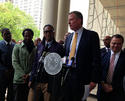Southern California has always been an invented place. Without a major river, a natural port or even remotely adequate water, the region has always thrived on reinventing itself – from cow town to agricultural hub to oil city, Tinsel Town and the “Arsenal of Democracy.” read more »
Economics
Twitter And The Real Economy Of Jobs
With Twitter’s high-profile IPO, the media and much of the pundit class are revisiting one of their favorite themes: the superiority of the brash, young urban tech elite, who don’t need to produce much in the way of profits to be showered with investor cash. Libertarians will celebrate the triumph of fast-paced greed and dismiss concerns over equity; progressives may dislike the easy money but will be comforted when much of it ends up supporting their candidates and causes. read more »
Viewing McJobs From the Flip Side
The headline read, “We Have Become a Nation of Hamburger Flippers: Dan Alpert Breaks Down the Jobs Report.” Seems that Alpert, the managing partner of New York investment bank Westwood Capital, LLC, was unhappy that most of the jobs created in July were for low-wage workers. read more »
Exporting Metros
If there’s one thing that people of pretty much every political persuasion agree on, it’s the need to boost exports. This is true not just at the national level, but also the local one. The balance of world population and economic growth is outside the United States. McKinsey estimates that there will be an additional one billion people added to the global “consuming class” by 2025. An economy focused solely on a domestic American or North American market is missing a huge part of the addressable market, dooming it to slower growth. read more »
Bipartisan Distrust of the Beltway
Much has been written and spoken about the deep divide between “red” and “blue” America, but the real chasm increasingly is between Washington and the rest of the country. This disconnect may increase as both conservatives and liberals outside the Beltway look with growing disdain upon their “leaders” inside the imperial capital. Indeed, according to Gallup, trust among Americans toward the federal government has sunk to historic lows, regarding both foreign and domestic policy.
The debate over Syria epitomizes this division. For the most part, Washington has been more than willing to entertain another military venture. This includes the Democratic policy establishment. You see notables like Anne Marie Slaughter and the New York Times' Bill Keller join their onetime rivals among the neoconservative right in railing against resurgent “isolationism” on the Right. read more »
California’s New Feudalism Benefits a Few at the Expense of the Multitude
California has been the source of much innovation, from agribusiness and oil to fashion and the digital world. Historically much richer than the rest of the country, it was also the birthplace, along with Levittown, of the mass-produced suburb, freeways, much of our modern entrepreneurial culture, and of course mass entertainment. For most of a century, for both better and worse, California has defined progress, not only for America but for the world. read more »
The Unrise of the Creative Working Class
Scarcity leads to creativity out of necessity. That’s the pop culture meme at least. Think “starving artist,” or the survivors in Survivor. The thinking has penetrated the business culture as well. For example, in the shadow of the 2008 recession, Google founder Sergey Brin, in a letter to his shareholders, writes: “I am optimistic about the future, because I believe scarcity breeds clarity: it focuses minds, forcing people to think creatively and rise to the challenge.” read more »
The Next Urban Crisis, And How We Might Be Able To Avoid It
Urban boosters are rightly proud of the progress American cities have made since their nadir in the 1970s; Harvard economist Ed Glaeser has gone so far as to proclaim “the triumph of the city.” Yet recent events — notably Detroit’s bankruptcy and the victory of left-wing populist Bill de Blasio in the Democratic primary of the New York mayoral election — suggest that the urban future may prove far more problematic than commonly acknowledged. read more »
Fast-Growing Mining and Oil & Gas Industries, and the Huge Number of Supply-Chain Jobs They Create
The fastest-growing industry in the U.S since 2010 isn’t large or well-known. In fact, nearly half of the estimated 5,100 jobs in support activities for metal mining are located in one state: Nevada. Nonetheless, employment in this niche mining industry has ballooned 53% since 2010, and it creates a huge number of supply-chain jobs in other parts of the economy. read more »
- Login to post comments
America's True Power In The NAFTA Century
OK, I get it. Between George W. Bush and Barack Obama we have made complete fools of ourselves on the international stage, outmaneuvered by petty lunatics and crafty kleptocrats like Russia’sVladimir Putin. Some even claim we are witnessing “an erosion of world influence” equal to such failed states as the Soviet Union and the French Third Republic. read more »






















